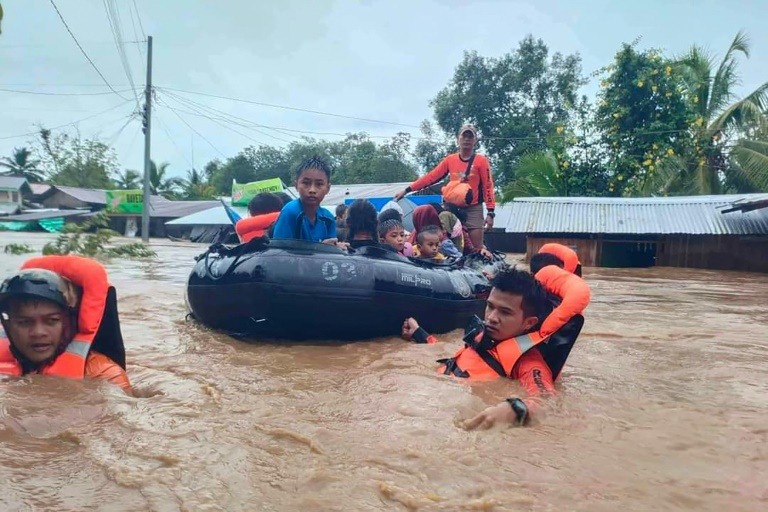A storm in the Philippines unleashed flash floods carrying uprooted trees, rocks and mud overnight
Landslides and flooding in the southern Philippines killed at least 67 people on Friday, according to an official tally, with rescuers racing to save residents of a mountain village that was buried in mud.
The village of Kusiong accounted for many of the 50 deaths in the area around Datu Odin Sinsuat town, after heavy overnight rain unleashed floods mixed with mud, rocks and fallen trees that buried the community, the area’s civil defence office said in a statement.
Similar avalanches also struck villages in the nearby towns of Datu Blah Sinsuat and Upi, which accounted for 17 more deaths.
Eleven people remain missing and 31 were injured, according to official figures.
Flash floods from rains wrought by Tropical Storm Nalgae swamped nine mostly rural towns around Cotabato, a city of 300,000 people on Mindanao island that was also submerged in widespread flooding.
Many residents were caught by surprise as floodwaters rose rapidly before dawn, Naguib Sinarimbo, the spokesman and civil defence chief for the regional government, told AFP.
Teams in rubber boats had rescued residents from rooftops in some towns, Sinarimbo said.
In recent years, flash floods with mud and debris from largely deforested mountainsides have been among the deadliest hazards posed by typhoons in Philippine communities.
Mindanao is rarely hit by the 20 or so typhoons that strike the Philippines each year and kill hundreds of people. Those that do, however, tend to be deadlier than those that hit the country’s main island of Luzon.
A long mountain range walls off most of Luzon from the Pacific, where most storms are spawned, helping to absorb the blow, the state weather service said.
Local filmmaker Remar Pablo told AFP he was shooting a beauty pageant in Upi when the floodwaters suddenly came in after midnight and forced audience members to flee.
A row of cars sat half-submerged on the street outside, video footage showed.
“We were stranded inside,” said Pablo, who eventually waded through the water to get home.
Rescuers carried a baby in a plastic tub as they navigated chest-deep water, a photo posted by the provincial police showed.
– ‘It was a shock’ –
Floodwaters have receded in several areas, but Cotabato remained almost entirely waterlogged.
Sinarimbo said there could be more flooding over the next few hours because of heavy rain over mountains surrounding the Cotabato river basin.
The army deployed its trucks to collect stranded residents in Cotabato and nearby towns, provincial civil defence chief Nasrullah Imam said.
“It was a shock to see municipalities which had never flooded getting hit this time,” Imam said, adding that some families were swept away when the waters hit their homes.
The heavy rainfall began late Thursday in the impoverished region, which is under Muslim self-rule after decades of separatist armed rebellion.
The state weather office in Manila said the downpours were partly caused by Nalgae, which it expects to strengthen at landfall overnight Friday.
Nalgae headed northwest over water with maximum winds of 85 kilometres (53 miles) an hour just off Samar island late Friday and is forecast to track the Bicol peninsula early Saturday.
More than 7,000 people were evacuated from flood- and landslide-prone communities in these areas, the civil defence office said in an updated tally.
The coast guard also suspended ferry services in much of the archipelago nation, where tens of thousands of people board boats each day.
Scientists have warned that storms, which also kill livestock and destroy farms, houses, roads and bridges, are becoming more powerful as the world gets warmer because of climate change.
strs-cgm/aha









